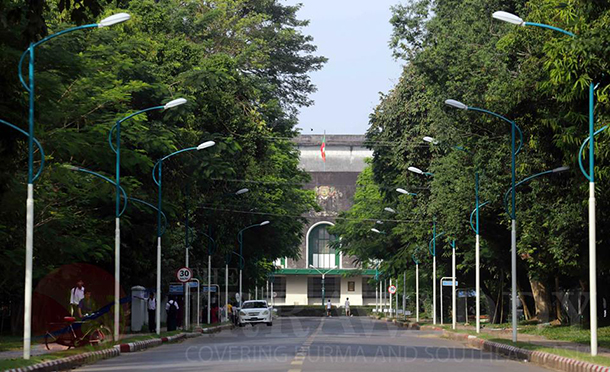RANGOON — The Myanmar Teachers’ Federation has said it “strongly condemns” the Education Ministry’s new approach to handling transfer orders for Burma’s university educators, which will see their postings determined by peer-based performance evaluations.
The Education Ministry recently issued details of a new procedure to rate the performance of teachers beginning this academic year, with the announcement communicated to rectors at Burma’s universities. Educators’ performance ratings will be based on an evaluation of 10 different factors and will be carried out by departmental colleagues.
The evaluations will be used to determine university educators’ promotions and transfer orders. Across Burma, university educators are rotated every one to three years, based on a combination of need and the requests of the educators. Because the nation’s more remote campuses are generally less desirable, the system sought to incentivize far-flung postings by tying promotions and pay raises to service in isolated areas.
Previously, transfer orders and promotions were determined largely by tenure, with longer-serving classroom educators given priority in the event that multiple requests were made for a given teaching position. Now, competing requests will be resolved via the peer-based performance evaluations.
Zaw Myo Hlaing, deputy chairman of the Myanmar Teachers’ Federation, said that among other complaints, the MTF considered the evaluations to be a poor gauge of the effectiveness of education professionals.
“The evaluation form includes 10 points. The questions look like questions you would ask of an ordinary civil servant but do not have relevance to university teachers,” he told The Irrawaddy.
“The [sample] questions are like, ‘Whether [the teacher] is willingly performing their duties,’ ‘Whether [the teacher] has good communication with their colleagues,” said Zaw Myo Hlaing, who is also an assistant lecturer at Dagon University in Rangoon.
The MTF said additionally, the new system could sow ill will among teaching colleagues.
“Some factors can incite enmity among teachers and divide them. The evaluations are also not related to the nature of teachers’ work,” the statement said.
The federation also criticized the evaluation system as biased, with classroom-based university educators being put under the microscope while senior administrative personnel like rectors and directors general escaped scrutiny.
The new system “fails to conduct evaluations on positions that need rating,” the MTF statement said. “The practice of evaluating only lower positions for ordinary education staff shows that the Education Ministry lacks goodwill and is not sincere toward teachers and the whole education sector, thus the Myanmar Teachers’ Federation strongly condemns the Education Ministry’s administrative change.”
The MTF also called on the ministry to issue transfer orders as soon as possible for affected teachers, some of whom have already begun teaching for the year but could receive transfer orders at any point.
Transfer orders are normally received in November of the preceding academic year but have not yet been issued this year, with the ministry blaming the death of former Education Minister Mya Aye for the delay. Mya Aye died in December 2013 and his successor, Khin San Yi, was not appointed until February.
















